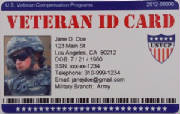|
|
|
|
|
|
Did You Know?
The Independent Living program is to make sure that each eligible veteran is able, to the maximum extent possible, to live independently and participate in family and community life increasing their potential to return to work. Services may include the following:
Eligibility Requirements Veteran's whose service-connected disabilities are so severe they are currently unable to purse an employment goal.
How Is The Determination Made? When a Vocational Rehabilitation Counselor (VRC) determines that employment goals are not currently feasible. An evaluation of the veteran's independent living needs will be conducted. The VRC and veteran will work together to identify the veteran's needs. Together they will determine services required to address the identified needs. An individualized Independent Living Program will be written providing the services necessary to meet the veteran's identified needs. Referral to specialized rehabilitation facilities and / or for consultation with other rehabilitation professionals may be necessary in the development and implementation of a veteran's ILP.
Dependent Education Assistance Program Dependents' Educational Assistance provides education and training opportunities to eligible dependents of certain veterans. The program offers up to 45 months of education benefits. Effective October 1, 2013 some DEA beneficiaries may be eligible for 81 months of GI Bill benefits if they are eligible for more than one education benefit.
These benefits may be used for degree and certificate programs, apprenticeship, and on-the-job training. If you are a spouse, you may take a correspondence course. Remedial, deficiency, and refresher courses may be approved under certain circumstances.
Eligibility You must be the son, daughter, or spouse of:
|
|
|
|
|
|
|

